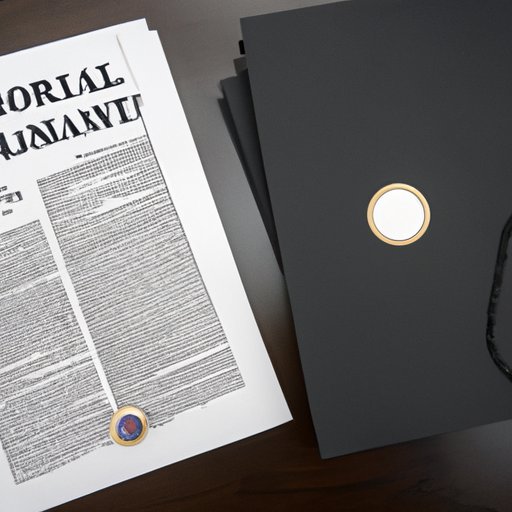Introduction
A criminal record is an official document that lists a person’s criminal history, including any convictions, arrests, and other legal proceedings. Depending on the nature of the offense, criminal records can remain on file for an extended period of time. If you have been convicted of a crime, it is important to know what your criminal record looks like and how to access it.
In this article, we will discuss how to get your criminal record, including contacting the court where you were convicted, researching state and local laws, considering expungement or sealing of records, consulting an attorney specializing in criminal law, and taking advantage of online resources.

Contact the Court Where You Were Convicted
The first step in getting your criminal record is to contact the court where you were convicted. Depending on the jurisdiction, you may be able to request your criminal record directly from the court. You may also be able to request your criminal record from the prosecutor or public defender who represented you during your trial.
When requesting your criminal record from the court, it is important to provide as much information as possible. This includes the date of your conviction, the name of the court, and the case number. It is also helpful to include a copy of your driver’s license or other form of photo identification.
It is important to note that some courts charge a fee for obtaining criminal records. Additionally, some states have laws that limit access to criminal records. Be sure to research your state’s laws before requesting your criminal record.
Research State and Local Laws
In addition to researching any laws that may limit access to your criminal record, it is important to research state and local laws that might affect your ability to obtain certain jobs, housing, or other privileges. For example, some states have laws that prohibit employers from asking about past criminal convictions or disqualifying applicants based on their criminal records.
Finding relevant state and local laws can be challenging. The best place to start is by visiting your state government’s website. You can also search for legal resources online or check with your state’s bar association. Finally, if you are unable to find the information you need, you may want to consider consulting with an attorney specializing in criminal law.

Consider Expungement or Sealing of Records
If you are concerned about your criminal record, you may want to consider expungement or sealing of records. Expungement is a legal process that allows individuals to have their criminal records erased, while sealing of records prevents the public from accessing criminal records. In some cases, expungement or sealing of records can make it easier to obtain employment, housing, and other privileges.
Before deciding to pursue expungement or sealing of records, it is important to understand the pros and cons. While expungement or sealing of records can make it easier to obtain certain privileges, it is not always an option. Additionally, there may be fees associated with the process. It is important to research your state’s laws and consult with an attorney specializing in criminal law before making a decision.

Consult an Attorney Specializing in Criminal Law
If you are considering expungement or sealing of records, it is important to consult with an attorney specializing in criminal law. An experienced attorney can provide helpful advice and can help you navigate the legal process. When looking for an attorney, it is important to make sure that they have experience with criminal law and a track record of successful cases.
You can find qualified attorneys through word-of-mouth referrals, legal directories, and online resources. It is also important to read reviews and ask questions to ensure that you are comfortable working with the attorney before signing a contract.
Take Advantage of Online Resources
In addition to consulting with an attorney, there are a variety of online resources available to help you understand the process of getting your criminal record. These resources can provide helpful information on obtaining your criminal record, researching state and local laws, considering expungement or sealing of records, and finding an attorney.
Some useful online resources include the National Institute of Justice, the Federal Bureau of Investigation, and the American Bar Association. Additionally, many states and local governments have websites that provide information on criminal records and related laws.
Conclusion
Getting your criminal record is an important step in understanding your legal rights and taking control of your future. By contacting the court where you were convicted, researching state and local laws, considering expungement or sealing of records, consulting an attorney specializing in criminal law, and taking advantage of online resources, you can better understand your criminal record and take steps to protect your rights.
By taking these steps, you can gain a better understanding of your criminal record and make informed decisions about your future. Don’t hesitate to take action today and get your criminal record.
(Note: Is this article not meeting your expectations? Do you have knowledge or insights to share? Unlock new opportunities and expand your reach by joining our authors team. Click Registration to join us and share your expertise with our readers.)
